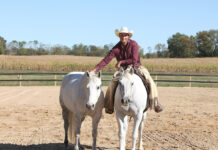Q: I’ve seen professional riders counter bend their horse before asking for a canter transition from the walk or trot. When I counter bend, my horse just feels disconnected with his neck to the outside. How can I make the counter bend an effective exercise?

If you are using your seat and leg and supporting your request with your outside rein as an aid, your inside hand will be free. If you hang on your inside rein, you’re essentially closing the door on your horse. He can’t pick up the inside lead if you’re holding the inside rein. You want to create a situation where there is nothing constricting your horse from picking up the correct lead.
Remember that your outside rein controls pace, and your inside rein controls direction. If your horse is counter-bent and you’re ready for the canter transition, put weight in your outside stirrup, release the outside rein to allow your horse to come forward, and ask for the inside lead.
When you ask for a counter bend, don’t focus so much on the fact that you’re bending your horse. Focus on the idea that you’re setting your horse up for the canter departure.
Ronnie Quest has been working with horses and riders in the English discipline for over 40 years. He and his wife, Jaime, own and run Equestrian Stables in Lubbock, Texas.
This article originally appeared in the November 2015 issue of Horse Illustrated magazine. Click here to subscribe!





